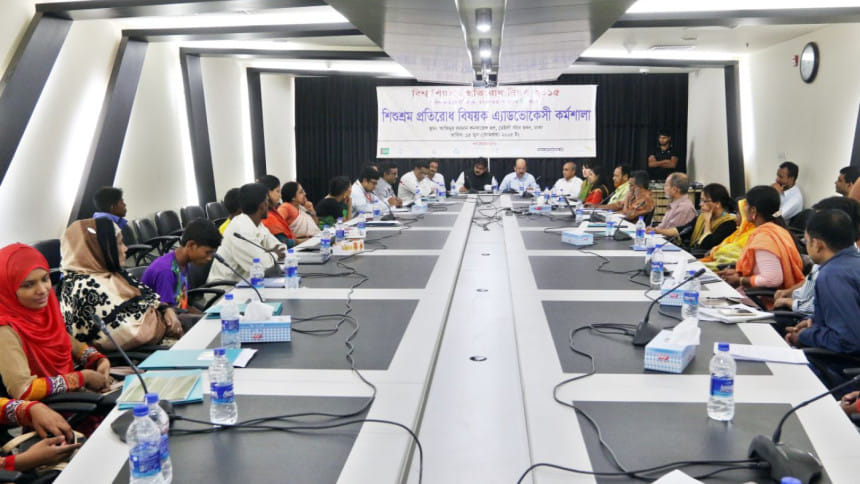Get child workers back to school

When asked if he goes to school, 14-year-old Rubel, helper of small passenger vehicle Leguna, gave a blank look.
"I work from 6:00am to 11:00pm and earn Tk 200-300 per day to support my family," he replied.
At the same age, waste picker Mohammad Shanto also dropped out of school for the same reason.
"I left school seven years ago after studying up to class II to help my father collect waste and drive the city corporation garbage van in Mohammadpur's Tajmahal road area," Shanto told the Advocacy Workshop on Reducing Child Labour at The Daily Star Centre.
The programme was organised by the Centre for Services and Information on Disability and Shapla Neer along with eight other local NGOs with fund from the Australian government and World Vision Australia, marking World Day Against Child Labour, observed on June 12.
Focusing on this year's theme "No to child labour and yes to quality education", speakers said the government should support families to get their children back to school.
According to a concept paper presented at the workshop, 35 percent of children drop out before getting through class V and start working.
Aminul Islam, joint secretary at the women and children affairs ministry, spoke of the government's initiative to provide 40,000 children from underprivileged families Tk 2,000 per month under the Enabling Environment for Children Project, with conditions that the children cannot engage in labour or marital relationships.
As per a 2003 Bangladesh Bureau of Statistics (BBS) and International Labour Organisation (ILO) survey, 78 lakh children were engaged in economic activities in Bangladesh, out of which 32 lakh were child labourers and 13 lakh were involved in hazardous work.
Among the child workers, 17.4 percent worked in Dhaka.
A 2007 survey by Unicef and ILO showed that 4.2 lakh children in the country were domestic workers and 83 percent girls. A domestic labourer on average works 14 hours per day and earns Tk 509 per month, it said.
Speakers stressed the need for a safety net for the urban poor, updated data on child labour, and a separate directorate for children. Munira Sultana, project coordinator, ILO, however, said ILO and BBS would publish survey results on the issue at the end of this year.
Abul Kashem, joint secretary at the labour and employment ministry, emphasised increasing awareness about child labour and taking legal action against individuals and institutions who employ children.
"People employ children because their labour is cheap and they cannot bargain," said lawmaker Israfil Alam, adding poverty, social norms and practices and lack of education were the main causes of child labour.
The MP asked NGOs to work with the government to bring out the 6.5 lakh children who work in nine sectors in Dhaka under hazardous conditions, which include leather and chemical factories, stone breaking, motor garages, welding, hotels and restaurants, and book binding.

 For all latest news, follow The Daily Star's Google News channel.
For all latest news, follow The Daily Star's Google News channel. 



Comments